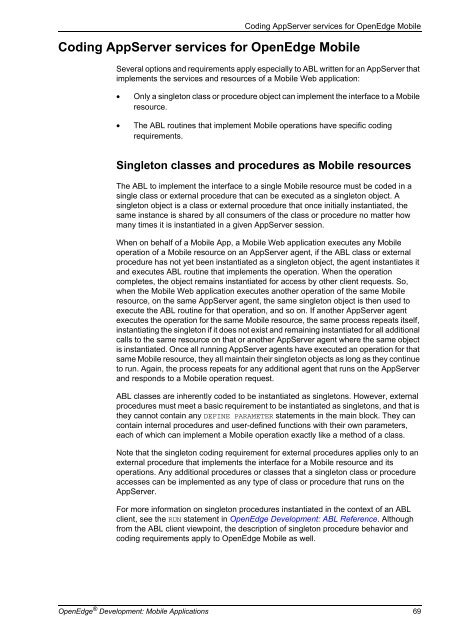OpenEdge Development: Mobile Applications - Product ...
OpenEdge Development: Mobile Applications - Product ...
OpenEdge Development: Mobile Applications - Product ...
You also want an ePaper? Increase the reach of your titles
YUMPU automatically turns print PDFs into web optimized ePapers that Google loves.
Coding AppServer services for <strong>OpenEdge</strong> <strong>Mobile</strong><br />
Coding AppServer services for <strong>OpenEdge</strong> <strong>Mobile</strong><br />
Several options and requirements apply especially to ABL written for an AppServer that<br />
implements the services and resources of a <strong>Mobile</strong> Web application:<br />
• Only a singleton class or procedure object can implement the interface to a <strong>Mobile</strong><br />
resource.<br />
• The ABL routines that implement <strong>Mobile</strong> operations have specific coding<br />
requirements.<br />
Singleton classes and procedures as <strong>Mobile</strong> resources<br />
The ABL to implement the interface to a single <strong>Mobile</strong> resource must be coded in a<br />
single class or external procedure that can be executed as a singleton object. A<br />
singleton object is a class or external procedure that once initially instantiated, the<br />
same instance is shared by all consumers of the class or procedure no matter how<br />
many times it is instantiated in a given AppServer session.<br />
When on behalf of a <strong>Mobile</strong> App, a <strong>Mobile</strong> Web application executes any <strong>Mobile</strong><br />
operation of a <strong>Mobile</strong> resource on an AppServer agent, if the ABL class or external<br />
procedure has not yet been instantiated as a singleton object, the agent instantiates it<br />
and executes ABL routine that implements the operation. When the operation<br />
completes, the object remains instantiated for access by other client requests. So,<br />
when the <strong>Mobile</strong> Web application executes another operation of the same <strong>Mobile</strong><br />
resource, on the same AppServer agent, the same singleton object is then used to<br />
execute the ABL routine for that operation, and so on. If another AppServer agent<br />
executes the operation for the same <strong>Mobile</strong> resource, the same process repeats itself,<br />
instantiating the singleton if it does not exist and remaining instantiated for all additional<br />
calls to the same resource on that or another AppServer agent where the same object<br />
is instantiated. Once all running AppServer agents have executed an operation for that<br />
same <strong>Mobile</strong> resource, they all maintain their singleton objects as long as they continue<br />
to run. Again, the process repeats for any additional agent that runs on the AppServer<br />
and responds to a <strong>Mobile</strong> operation request.<br />
ABL classes are inherently coded to be instantiated as singletons. However, external<br />
procedures must meet a basic requirement to be instantiated as singletons, and that is<br />
they cannot contain any DEFINE PARAMETER statements in the main block. They can<br />
contain internal procedures and user-defined functions with their own parameters,<br />
each of which can implement a <strong>Mobile</strong> operation exactly like a method of a class.<br />
Note that the singleton coding requirement for external procedures applies only to an<br />
external procedure that implements the interface for a <strong>Mobile</strong> resource and its<br />
operations. Any additional procedures or classes that a singleton class or procedure<br />
accesses can be implemented as any type of class or procedure that runs on the<br />
AppServer.<br />
For more information on singleton procedures instantiated in the context of an ABL<br />
client, see the RUN statement in <strong>OpenEdge</strong> <strong>Development</strong>: ABL Reference. Although<br />
from the ABL client viewpoint, the description of singleton procedure behavior and<br />
coding requirements apply to <strong>OpenEdge</strong> <strong>Mobile</strong> as well.<br />
<strong>OpenEdge</strong> ® <strong>Development</strong>: <strong>Mobile</strong> <strong>Applications</strong> 69
















